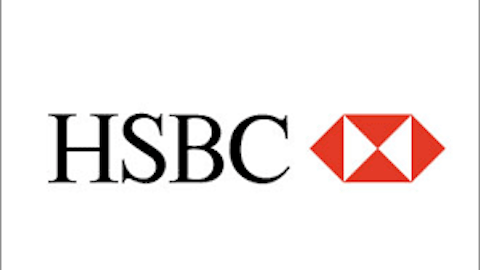LONDON — I’m looking at some of your favorite FTSE 100 companies and examining how each will deliver their dividends.
Today, I’m putting banking behemoth HSBC Holdings plc (LON:HSBA) under the microscope.
Dividend history
Three main events have affected on HSBC Holdings plc (LON:HSBA) shareholders’ dividends over the last 15 years:
A change from sterling to U.S. dollars as the company’s reporting currency from 1998
The table below shows the company’s dividend history for the last 15 years.
| Year | Dividends | $Dividend Growth (%) | Dividends | £ Dividend Growth (%) |
|---|---|---|---|---|
| 2012 | $0.45 | +9.8 | 28.53p | +9.9 |
| 2011 | $0.41 | +13.9 | 25.97p | +14.2 |
| 2010 | $0.36 | +5.9 | 22.74p | +6.8 |
| 2009 | $0.34 | -46.9 | 21.30p | -44.3 |
| 2008 | $0.64 | -28.9 | 38.26p | -15.2 |
| 2007 | $0.90 | +11.1 | 45.12p | +7.6 |
| 2006 | $0.81 | +11.0 | 41.94p | +4.0 |
| 2005 | $0.73 | +10.6 | 40.34p | +14.1 |
| 2004 | $0.66 | +10.0 | 35.36p | +2.5 |
| 2003 | $0.60 | +13.2 | 34.51p | +3.3 |
| 2002 | $0.53 | +10.4 | 33.40p | +2.1 |
| 2001 | $0.48 | +10.3 | 32.70p | +9.1 |
| 2000 | $0.43 | +27.9 | 29.97p | +41.6 |
| 1999 | $0.34 | +10.4 | 21.16p | +12.6 |
| 1998 | $0.31 | n/a | 18.8p | n/a |
Reporting currency
HSBC Holdings plc (LON:HSBA)‘s switch to U.S. dollars as its reporting currency means dividends are also set by reference to dollars. The sterling dividend is consequently subject to the vagaries of exchange rates.
As the table above shows, U.K. investors taking their dividends in sterling have done relatively well since the 2008 financial crisis, but were disadvantaged by exchange rates for most of the 2001-07 period, and again did relatively well around the turn of the millennium.
I remember some years ago HSBC Holdings plc (LON:HSBA) suggested — not very helpfully for small private investors — that U.K. shareholders could protect themselves from exchange rates by using derivatives or electing to take their dividends in dollars!
So, there are two things U.K. investors should bear in mind: first, sterling dividends are relatively erratic, and second, recent strong (or modest) growth in the sterling dividend can be a misleading guide to upcoming growth.
Quarterly dividends
HSBC’s shift to paying quarterly dividends helpfully gives shareholders some visibility on the dividends ahead. The board’s policy is to pay equal dividends for the first three quarters and a variable fourth.
The visibility comes in because HSBC Holdings plc (LON:HSBA) announces the dividend level for the first three quarters when it releases its results for the previous year. Thus, when the company released its latest annual results on 4 March, the board said it would be paying a $0.10 dividend for the first three quarters of 2013.
2008 financial crisis
HSBC slashed its dividends in 2008 and 2009 as a result of the global financial crisis. The company said: “After 15 years of double-digit [dollar] dividend growth, we did not make the decision to lower the dividend lightly.” Management expressed its long-term confidence in the company and said that from the rebased dividend level, “HSBC will continue to aim to pay progressive dividends in line with the long-term growth of the business.”
Looking ahead
The market sees the banking sector as being on the road to recovery. City analysts are forecasting strong earnings growth from HSBC Holdings plc (LON:HSBA), supporting an 18% uplift in the dividend this year — giving a 4.8% yield at a current share price of 698 pence — followed by an 11% rise in the dividend for 2014. Just remember, though, that these numbers are not only forecasts, but are also subject to future movements in the dollar-sterling exchange rate!
The article How HSBC Holdings Will Deliver Its Dividend originally appeared on Fool.com and is written by G. A. Chester.
G. A. Chester does not own any shares mentioned in this article. The Motley Fool has a disclosure policy. We Fools may not all hold the same opinions, but we all believe that considering a diverse range of insights makes us better investors.
Copyright © 1995 – 2013 The Motley Fool, LLC. All rights reserved. The Motley Fool has a disclosure policy.



